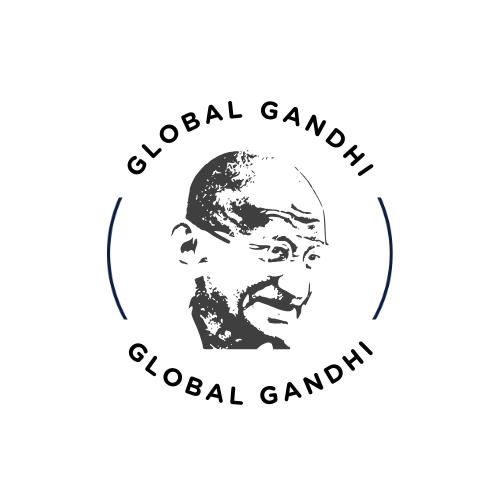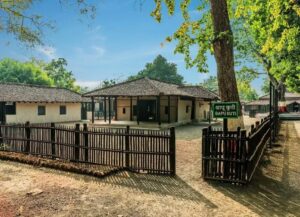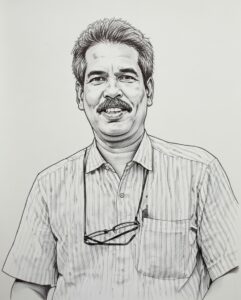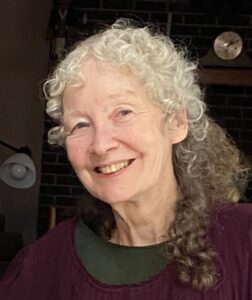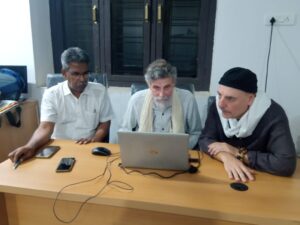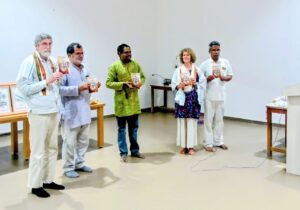The dominant economic system or capitalism, has led to increased inequality and economic hardship for the common man, particularly the poorest of the poor, or “Daridra Narayan” in Gandhi’s words. This system tends to concentrate wealth and power in the hands of a few, leaving many trapped in poverty and widening the gap between the haves and have-nots. Corporate dominance, or “corporatocracy,” has become a reality, exerting significant influence over economic, political, and judicial systems. It would not be an exaggeration if we say that corporations have intruded into every aspect of human life. They exert undue influence over people’s lives, shaping their choices in areas like food, clothing, and even thought, is a matter of grave concern. The ever-increasing corporate dominance which we witnessed today has exacerbated economic inequalities worldwide. Large-scale production and unbridled exploitation of resources have led to climate change, threatening the very survival of humanity and mother earth. Gandhian economic vision expounded by J. C. Kumarappa has become more relevant than ever before. The search for alternatives to the exploitative models of growth demands the need for study and practical application of economy of permeance or peace enunciated by J.C. Kumarappa. It is a decentralized, ethical, and sustainable economy, rooted in the principles of truth, non-violence and compassion. The online study programme on Kumarappa’s economic thought initiated by the Gandhian Collective, in collaboration with the Library and Research Centre for Gandhian Studies, Sevagram Ashram Pratishthan, Wardha, aims to bring these ideas into public discourse, targeting activists, academics, policy thinkers, and students concerned about the common man and the environment. By exploring Gandhian economics, participants can gain insights into alternative models of growth that prioritize human well-being and sustainability.
In this course, to begin with, we will try to understand the development and transformations of the capitalist economic system. It will be followed by examining the implications of Donald Trump’s second term as President of the US. There is no doubt that his presidency has created a global economic crisis. Corporate dominance or corporatocracy is a reality now, even in India. Against this background, we will discuss the relationship between public finance and poverty. There is no doubt that the 17 Sustainable Development Goals of the United Nations Organization will not be achieved by 2030. Therefore, it is essential to discuss sustainable production systems and understand economic policies from the colonial period to the current day. We also explore the intersection of economic principles and modern technological advancements, the interconnection between Economics and Democratic Values, Ethical Values of Rural Economy, and Economic Growth and Environmental Sustainability. Furthermore, we will investigate the connection between national identity and the goal of rural self-reliance. We will conclude the study course by discussing the principles of self-reliance (Swadeshi) and self-governance (Swaraj) in the context of a contemporary movement for greater autonomy or freedom.
As a student of Gandhian thought, I had the opportunity to study and understand the philosophy and economic vision of Kumarappa. I read Kumarappa’s biography, “The Gandhian Crusader,” written by one of his closest associates, M. Vinaik, way back in 1992. Many people often describe him as Doctor J.C. Kumarappa. It is an honorary title given by Mahatma Gandhi himself. Gandhi, in his foreword to the book “Economy of Permanence,” described J.C. Kumarappa as “Doctor of Village Industries” and not as Prof. Kumarappa. Kumarappa referred back to Gandhi to get his permission to amend his foreword accordingly. Gandhi wrote back that he meant every word he had written and that nothing should be altered in the foreword; it should go into print as it was. Later, when he met Gandhi, Kumarappa teased him about Mahatma’s arrogance in conferring doctorates on whomever he pleased and, what was more, coining new degrees to suit his purpose. Gandhi replied with a good-humoured laugh, “Why should you question my authority to confer doctorates or coin degrees? Am I not the Chancellor of Gujarat Vidyapith?” Kumarappa himself described this in one of his articles on Gandhi viz. “The Chancellor of Gujarat Vidyapith” in Reminiscences of Gandhiji, edited by Chandrashanker Shukla, published in 1951.
It is significant to know in brief the life and contributions of Kumarappa and how he was drawn into Gandhi’s philosophy and methods of action. Joseph Chelladurai Cornelius, later known as J.C. Kumarappa, was born on January 4, 1892, in a pious Christian family in Thanjavur, Tamil Nadu. He was the seventh child of Solomon Doraisamy Cornelius, an officer in the Public Works Department of the Government of Madras, and Esther Rajanayagam from the well-known family of poet Vedanayaga Sastriyar. Young Joseph Chelladurai was lovingly called “Chella” by his sisters and brothers. The English name “Cornelius” was taken by his paternal grandfather, an Anglican clergyman, Rev. John Cornelius.
His family shifted to Madras when he was around 12 years old and joined Doveton College and later Madras Christian College. According to his biographer, M. Vinaik, his mother contributed significantly to his moral and spiritual upbringing, while his father laid the foundation for social living. His father was a “strict disciplinarian, punctual, systematic, accurate, and of few words.”
Joseph Chelladurai left for London in 1912 to pursue a Chartered Accountancy course. He qualified as an Incorporated Accountant and established himself as a successful auditor while working in a British firm. After returning from London in 1919, he set up his practice in Bombay, first with an English firm, Ford, Rhodes, and Parks. In 1924, he established an auditing firm under the name Cornelius and Davar.In 1927, he went on a holiday to the USA but decided to join Syracuse University and completed his BSc in Business Administration in 1928. This was made possible by his training as an Incorporated Accountant. The next year, he moved to Columbia University to study Public Finance.
He used to address various subjects on weekends, and in one of his lectures in a church, he dealt with the subject “Why then is India Poor?” The audience was overwhelmed, and the New York Times reported on his presentation. His Principal Professor, Dr. E.R.A. Seligman, was highly impressed and suggested that he should focus on the causes of Indian poverty through Public Finance for his Master’s thesis. This study marked a turning point in his life, as he became more convinced about the injustice and exploitation perpetuated by the British Administration. As a result, he lost faith in their “well-meaning bureaucracy and their God-sent mission.” At Columbia University, he took a seminar on “The Economics of Enterprise” with Dr. H.J. Davenport, who believed that individual profit should be the primary consideration in economics. Chelladurai disagreed with this perspective, and despite their differences, Prof. Davenport recognized his original thinking and awarded him an A grade. Once, Pandit Madan Malaviya complimented Gandhi on the wonderful training he had given Kumarappa, to which Gandhi replied, “I have not trained Kumarappa; he came to me ready-made.” Kumarappa’s biographer described him as “Davenport-made.”
The historic meeting between Gandhi and Kumarappa took place on May 9, 1929, at Satyagraha Ashram, Ahmedabad, where they discussed Kumarappa’s work, “Public Finance and Our Poverty.” Gandhi took consent from Kumarappa to publish his article in Young India, which was serialized from November 28, 1929, to January 23, 1930. Kumarappa initially wore Western-style dress but later adopted simpler attire and gave up Western food habits when he decided to work with Gandhi. He embraced Khadi, a symbol of decentralization and economic freedom, and decided to revert to his roots by changing his family name to Kumarappa. Impressed by his original thinking, Mahatma Gandhi asked him to conduct a survey of a rural area in Gujarat. Due to the language barrier, Kumarappa was initially hesitant; however, Gandhi assured him that professors and students from Gujarat Vidyapith would assist in the study. Following Gandhi’s suggestion, Kumarappa met with Kaka Kalekar, the Vice Chancellor, in an interview that proved transformative in his journey to become a Gandhi disciple. Kumarappa later expressed interest in joining the Vidyapith faculty, and Kaka Kalekar readily accepted his proposal. During his tenure, he gained a deeper understanding of Gandhi’s nonviolent approach and constructive work aimed at liberating India from British rule. He became deeply immersed in Gandhian thought and declined a salary as a professor at Vidyapith.
As per Gandhi’s request, Kumarappa conducted an economic survey of Matar Taluk. The survey results were published with a foreword by Kaka Kalekar, providing an authoritative insight into the economic conditions and plight of the villagers. During the Dandi March, Gandhi met with Kumarappa, assigning him to contribute articles and assist Mahadev Desai. However, Desai was arrested, followed by Gandhi, and Kumarappa took over as editor of Young India. His brief tenure as editor significantly impacted journalism. Due to his severe criticism of the British government, Kumarappa was sentenced to one year and six months of rigorous imprisonment but was released early following the Gandhi-Irwin Pact.
In 1931, the Indian National Congress appointed a committee, with Kumarappa as convener, to investigate financial obligations between Britain and India. The committee concluded that approximately ₹1805.5 crores should be reclaimed from the British government due to war expenses unrelated to India being charged to Indian accounts. This is how Kumarappa, a professional chartered accountant turned economist, invited the ire of the British colonial administration through his work and activism.
Gandhi again entrusted Kumarappa with Young India’s responsibility while attending the Round Table Conference in London. Unfortunately, his vigorous journalism led to another sentence – two and a half years, which he served until the end of 1933 in Nashik Central Jail. After his release, Kumarappa was tasked with relief work following the 1934 Bihar earthquake. Kumarappa laid down strict rules and regulations in relief work, and Dr. Rajendra Prasad remarked, “Kumarappa has really saved the honour of Bihar.” This showcased his meticulous accounting skills and exemplary use of public money.
After the historic Salt March, Mahatma Gandhi came to Wardha in 1933 and embarked on a tour for the upliftment of Harijans from November till August 7, 1934. During this period, Gandhi decided to retire from the Indian National Congress and devote his energies to reviving Indian villages. At the Bombay session, the Congress agreed to Gandhi’s proposal for reviving village industries, and on October 28, 1934, Pattabhi Sitaramayya moved a resolution proposing the formation of the All-India Village Industries Association. J.C. Kumarappa was authorized to form it under Gandhi’s guidance. On December 15, 1934, while Gandhi was staying at Satyagraha Ashram, Wardha, the All India Village Industries Association was formed. Jamnalal Bajaj had donated twenty acres of land and a house to Gandhi at Wardha, which was renamed Maganwadi and became the headquarters of the All India Village Industries Association . Kumarappa served as the organizer and secretary of the All-India Village Industries Association, making remarkable contributions to its growth. His simple living arrangements and his hut in Maganwadi reflected his commitment to a life of utter simplicity despite being a Western-educated individual.
Kumarappa was a member of the Zakir Hussain Committee formed after the Basic Education conference in Wardha in October 1937. When Subhas Chandra Bose became the President of Indin National Congress in 1937, a National Planning Committee was appointed under Jawaharlal Nehru’s chairmanship, and Kumarappa was part of the committee.In 1939, with the onset of World War II, India faced a difficult period. Kumarappa exposed British tactics of inflation and exploitation in his article “Stone for Bread” , in the December1942 issue of Gram Udyog Patrika, an official organ of All India Village IndustriesAssociation, ultimately leading to a sentence of three terms of two and a half years in jail. After two years, his health deteriorated, and he was released. Upon release, his health improved, and he met Gandhi at Sevagram in 1944.Kumarappa was Chairman of the Agrarian Reforms Committee of Indian National Congress in 1947 and contributed significantly to the work of Gandhi Memorial Fund,New Delhi. He organized an Agrarian Research Centre, Pannai Ashram, near Wardha in 1951 but had to retire due to poor health in 1953 and moved to Gandhiniketan Ashram T. Kallupatti in Madurai ,Tamil Nadu. He passed away on 30 January 30 1960 on the eve of 12 th death anniversary of Mahatma Gandhi.
The work and writings of Kumarappa were mainly in the field of economics. It provides an alternative vision of an economy. E.F. Schumacher, a British economist, was inspired by Kumarappa’s work, which he later incorporated into his own ideas, particularly in his influential book “Small is Beautiful-Economics as if people mattered.” The common man was the pivot and centre of economics and he talked about People’s economy. According to Kumarappa, any economy associated with the name of Gandhi should be based on twin principles of truth and nonviolence. There is a realisation that there is an urgent need to revisit the economic principles developed by J.C. Kumarappa that prompted the initiation of this online study programme. We hope the deliberations will ultimately lead to the practical application of his principles and contribute towards a pro-poor economy.
The text of the inaugural address of Online course on J. C. Kumarappa delivered by Dr. Siby K. Joseph, Director, Sri Jamnalal Bajaj Memorial Library and Research Centre for Gandhian Studies, Sevagram Ashram Pratishthan, Wardha- 442102 Maharashtra . Email director jbmlrc@gmail.com
